School says farewell to beloved Professors
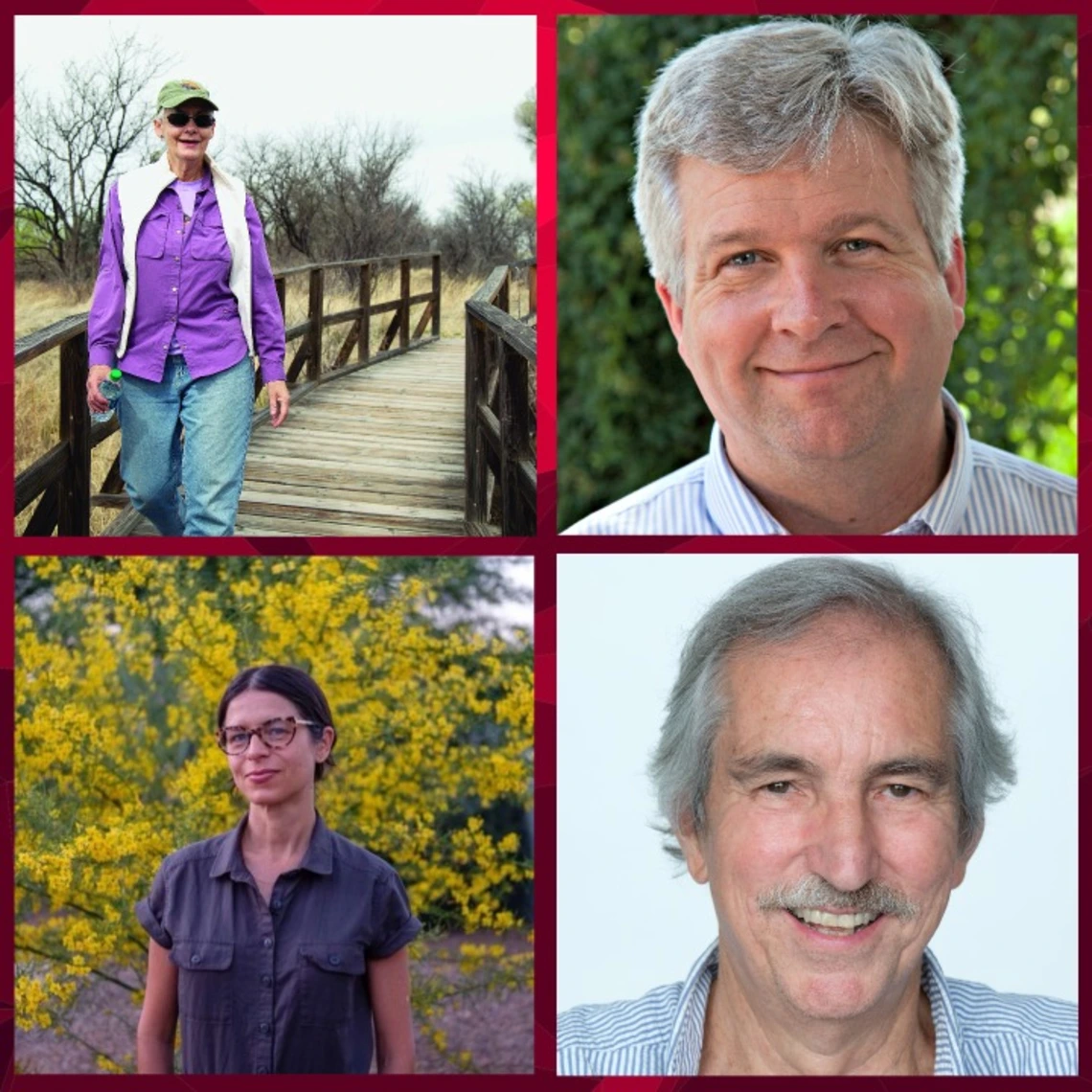
The University of Arizona School of Journalism wished four professors farewell on May 5 after decades of dedicated service to Tucson’s journalism students.
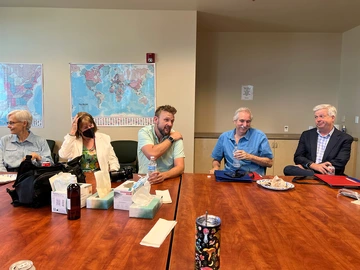
Professors Carol Schwalbe, Susan Swanberg, Mike McKisson, Kim Newton and David Cuillier share stories at the May 5 Farewell Event.
Alexandra Pere
Professors David Cuillier, Carol Schwalbe and Kim Newton officially retired from the School of Journalism at the end of May 2023. Professor Ruxandra Guidi moved on to pursue freelance journalism.
“We are so grateful for all of the professors who put time and effort into the success of our students. Their legacies will live on through all of the courses they taught and the students they inspired,” SOJ Director Jessica Retis said.
The School of Journalism held a farewell event that was attended by faculty, staff, former students, alumni and members of the SOJ advisory board.
“My first semester was teaching Journalism 306 with great students like Mr. Mike McKisson,” Cuillier said.
McKisson was a student of Cuillier, Schwalbe and Newton before he became a professor of practice.
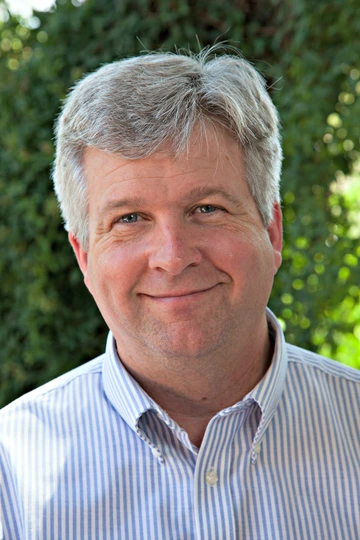
"I think students helped me learn to be a little more patient, caring and empathetic," Dr. Cuillier said.
University of Arizona
Dr. David Cuillier came to the School as a scholar focused on the Freedom of Information Act in 2006. He has trained nearly 10,000 people in FOIA and wrote, “The Art of Access: Strategies for Acquiring Public Records,” a widely adopted textbook in J-schools across the country.
Cuillier said he hopes to make his book free to the public online after starting his directorship at the Joseph L. Brechner Freedom of Information Project, which is housed in the University of Florida’s College of Journalism and Communications.
Cuillier led the School of Journalism from 2012 to 2018.
“Professor Cuillier was an amazing teacher and mentor to me,” said Alana Minkler, a journalism alum and Investigative Reporters and Editors club member. “He encouraged me to pursue my passion for investigative journalism and gave me so many tools for data reporting and record requests. Because of his teachings, I will always remember to seek strong data, be truthful and, of course, how to calculate a percent change.”
Minkler serves as an education reporter for the Santa Rosa Press Democrat. She said Cuillier’s support made a positive impact on her career.
Cuillier credits his students for his growth as a teacher.
“They taught me to be a better dad,” Cuillier said. “You know a lot of journalists are that old stereotype of aggressive or competitive reporters and editors and that doesn't always crossover into teaching very well. I think students helped me learn to be a little more patient, caring and empathetic.”
As director of the Brechner Project, Cuillier said he wants to focus on pushing back against government secrecy, which has steadily increased over the past 10 years.
“Ten years ago, if you submitted a FOIA request you'd get something back about half the time,” Cuillier said. “Now, it's 18% of the time.”
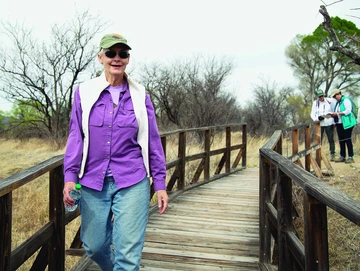
Prof. Carol Schwalbe visits the Buenos Aires National Wildlife Refuge in Southern Arizona.
John De Dios
Professor Carol Schwalbe defected from ASU’s Cronkite to the School of Journalism in 2010. She developed the school’s science journalism program and produced a science magazine in her classes from 2012-2017. She also served as director of the school from 2018 to 2021.
Before going into academia, Schwalbe worked for National Geographic from 1989-2002 as an articles editor. In 2000, National Geographic won the National Magazine Award for General Excellence, the highest honor in magazine journalism.
“She is the best teacher I’ve ever known,” Cuillier said to Schwalbe during the May 5 event.
Schwalbe helped build several popular courses, including travel journalism.
“Professor Schwalbe played a huge role in my pursuit of travel journalism,” former student Betty Hurd said. “She taught me how to bring a scene to life the way she did in her amazing career at Nat Geo.”
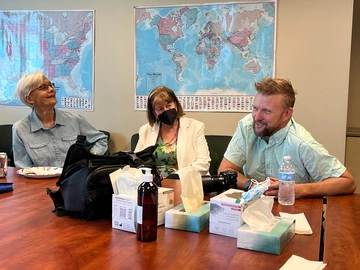
Professors Carol Schwalbe, Susan Swanberg and Mike McKisson share stories during the May 5 Farewell Event.
Alexandra Pere
Professor McKisson sought guidance from Schwalbe as a student and as a teacher. McKisson and Schwalbe shared an office.
“The thing I saw in those classes was how much you genuinely cared about the students, and they saw that,” McKisson said to Shwalbe. “They knew you wanted them to get better.”
Professor Kim Newton came to the School of Journalism in 2007 with almost three decades of photography experience.
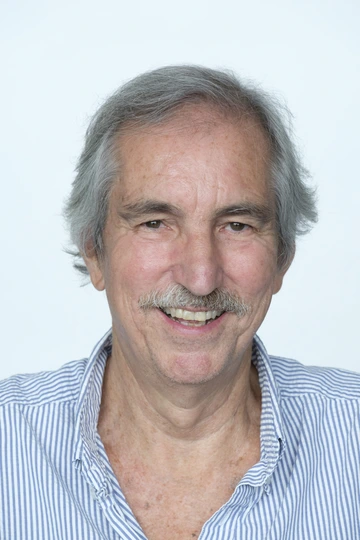
“I started to travel with him on assignments. I think the first assignment we went on I was like 14 and we went to Florida to do a big magazine piece,” Newton said.
University of Arizona
Newton’s passion for photography began when he was young. His father, popular British actor Robert Newton, died early in Kim’s life. His uncle Dan Budnik, a renowned photojournalist who lived in Tucson, took the boy under his wing and bought Newton his first camera.
“I started to travel with him on assignments. I think the first assignment we went on I was like 14 and we went to Florida to do a big magazine piece,” Newton said. “I can't remember who the magazine was for, but we went to the Everglades, the Keys and all over Florida.”
Newton freelanced and built a solid portfolio. He taught English in Japan, freelancing for Japanese publications at the same time. Soon after, he started receiving requests from American publications like The New York Times, Forbes, Business Week, People, Time and U.S. News & World Report.
Newton then joined Reuters as a picture editor. He followed up eight years at Reuters with a senior photo editor position at Knight Ridder/Tribune News Service in Washington, D.C.
Most notably, Newton is proudest of a photo he took while freelancing during the 1987 South Korean democracy movement. It’s a story that he shared in the documentary “Witnesses to Democracy: The Journey of a Mother and a Photographer.”
“Three trips to Korea to work on that documentary and that experience highlighted what I had done 30 years ago,” Newton said. “To have come full circle with that story based on a photograph that I took 30 years ago and the impact that one single photograph had on Korean society or a part of Korean society, it's just so incredible.”
Newton led the school’s photojournalism program and a popular study abroad program to Italy.
“Kim just has this joy about him. You know how you are only as old as how you feel? That’s Kim,” Graduate Program Coordinator Jennifer Bates said at the May 5 event.
Professors Newton and Schwalbe will continue to teach as adjunct instructors for the Studies of Global Media Program.
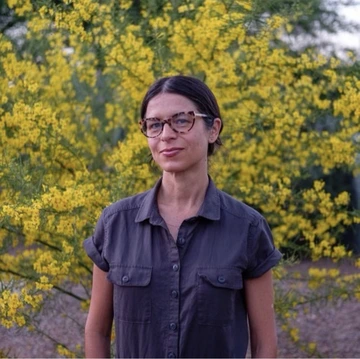
"I hope the audio program will grow and thrive, especially now that we have a podcasting studio and clearly so much interest from the students," Guidi said.
Bear Guerra
Professor Ruxandra Guidi came to the School of Journalism five years ago. She brought with her a wealth of knowledge on audio storytelling, feature writing, magazine writing, bilingual reporting and freelancing.
“Professor Guidi was an excellent mentor who helped me see the potential of long form feature writing and helped me to write my final story,” recent master’s student Luke Wink Moran said.
Throughout her career she contributed to a long list of outlets including High Country News, The Atlantic, Pacific Standard, BBC’s The World, Latino USA, The Guardian and NPR. She continued to freelance during her time at the School.
Recently, she edited an award-winning podcast, “Bone Valley,” and hosted two seasons of the podcast, “The Catch,” for Foreign Policy.
Guidi was pivotal in teaching journalism students how to create journalistic podcasts and the business of being a freelance journalist.
“I think some people fail to recognize the value that independent journalists bring to the field, to publications, and that's why it's not taken seriously,” Guidi said. “But freelance journalists make some of the best journalism around the world today.”
Guidi served as a mentor to many master’s students, including School of Journalism Outreach Coordinator Alexandra Pere.
“Rux put me on a track to success,” Pere said. “I didn’t think I belonged in journalism when I first came to the school because I’m not a great writer, but she took me under her wing and showed me that journalism comes in many different shapes and sizes.”
Guidi said she hopes her teachings about the business of freelancing and audio stick with the School, but for now she will continue to freelance. She expects to release two new investigative podcast series in 2024.

